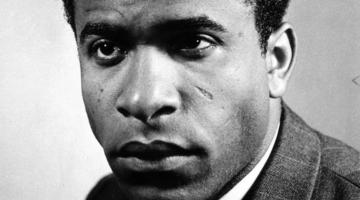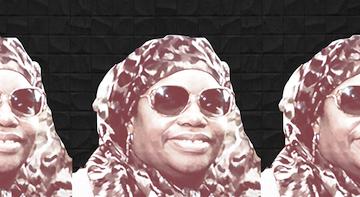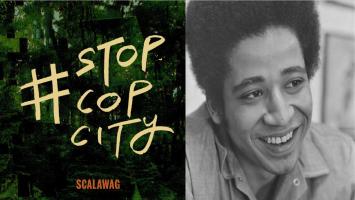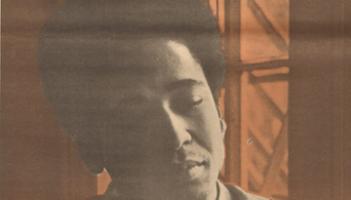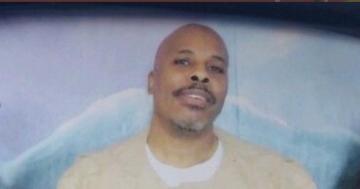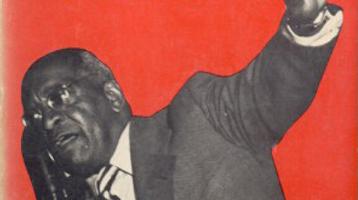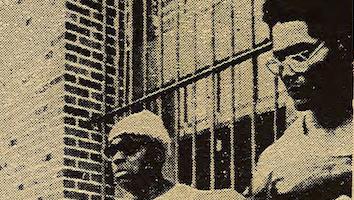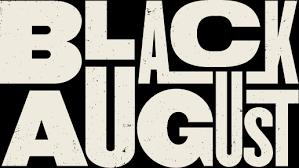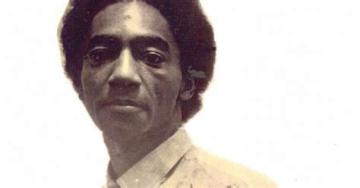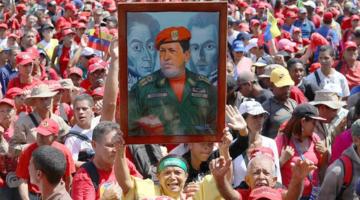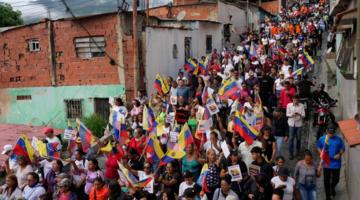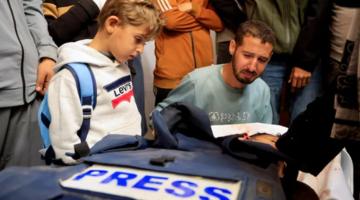Mireille Fanon Mendès-France, president of the Frantz Fanon Foundation, speaks during an anti-racist rally on September 5, 2020, in Paris, France. Thierry Nectoux / Gamma-Rapho via Getty Images
For Black August, Mireille Fanon Mendès-France sets the record straight on her father’s revolutionary legacy.
Originally published in Truthout.
Public gatherings this week in Jackson, Mississippi and New Orleans, Louisiana — featuring an especially distinctive guest — will honor the legacy of revolutionary psychiatrist Frantz Fanon (1925-1961). The Black Alliance for Peace, an African internationalist organization committed to peace and opposition to war and imperialism, and Cooperation Jackson, which is building a solidarity economy anchored by worker-owned co-ops in West Jackson, are co-hosting several Black August events with Fanon’s eldest daughter. Mireille Fanon Mendès-France is a jurist, an educator, and an anti-racism expert who passionately shares her father’s commitment to rebellion against colonialism in its many forms. She founded the Frantz Fanon Foundation in 2007 to connect his theoretical work to ongoing anti-colonialist struggles like those Black communities throughout the Deep South are facing, especially the kind of ongoing mass displacement that occurred in the aftermath of Hurricane Katrina 20 years ago. Kali Akuno of Cooperation Jackson told Truthout that Fanon Mendès-France has a great deal to share about her father’s contributions in raising consciousness about what it takes to fight against fascism, “because that is what we are staring down.”
Fanon fought the Nazis in World War II with the Free French Forces. Later, he fought for independence against the reactionary colonial regime in Algeria, which, Akuno said, used Nazi tactics against the national liberation movement. “We are doing this consciousness raising in a period where they are deliberately erasing all oppositional history and knowledge, and they’re doing it very intentionally under the color of law. If we don’t recall the lessons of our earlier generations who fought against colonial erasure, who fought against white supremacy, then we’re gonna lose this battle before it even begins.” Akuno explained that a backdrop to all this is the ongoing genocide in Palestine; Fanon Mendès-France is directly tied into the struggle of Arab and North African/Southwest Asian people. “There’s many intersections that we’re trying to get at this year, and she’s one of the best people who encapsulates it all.”
Shortly before her travels to the U.S., Mireille Fanon Mendès-France spoke to Truthout by phone about combating disinformation about her father’s work, her eagerness to be in community in the U.S. with anti-colonial activists, and why defeatism is not an option. The interview that follows has been lightly edited for clarity and length.
Frances Madeson: The centenary of Frantz Fanon has inspired commemorative events all over the world — in Martinique, the Caribbean island where he was born on July 20, 1925, into French colonial dominance in the region; across Europe, where he studied psychiatry and began to write explicitly about the anti-Black racism he encountered there; in Africa, where he lived and was engaged during the bloody struggle for Algerian independence from colonial France; and in the United States, where he died prematurely from leukemia on December 6, 1961, at only 36 years old.
His main books — The Wretched of the Earth (1961) and Black Skin, White Masks (1952) — are still in print and have been translated into more than 25 languages. His singular contributions to anti-colonial psychiatry and humanism are widely studied and deeply embedded in the practices of a growing cadre of Fanonian psychoanalysts who deploy his insights in the service of fostering anti-colonial consciousness in the Palestine solidarity movement and beyond. One would think Frantz Fanon’s legacy would be a settled matter. But is it?
Mireille Fanon Mendès-France: Unfortunately, no. The work of decolonial emancipation remains to be done. But before getting to these points, I would like to emphasize that this centenary has given rise to numerous events, particularly in Martinique. One was presented on March 15, 2025, by an organization founded by the Békés — who are descendants of former colonizers and enslavers who continue to control the island’s economy. This association, Tous Créoles, hosted an exceptional conference on Frantz Fanon entitled “Fanon the Humanist.”
Their aim was to demonstrate that the philosophy of Tous Créoles is in line with Frantz Fanon’s by extracting certain quotes and taking them out of context, thereby reinforcing their positions: “I am not a slave to the slavery that dehumanized my fathers. … I, a man of color, want only one thing: that the instrument never dominate man.” The use of these quotes supports their argument. Likewise, “There is no Negro mission; there is no white burden. There is a struggle for the triumph of human dignity, for the disappearance of human humiliation, whatever the origin of that humiliation.” These quotes can be interpreted in any way one wishes if one remains on the surface, but above all, they can be used to demonstrate that Frantz Fanon was not in contradiction with the dominant colonial thinking, particularly that of the Békés, who for several years have been trying to reverse the burden of proof by demonstrating, through this kind of instrumentalization of Frantz Fanon’s thinking, among other things, that they stand alongside the descendants of enslaved people.
These Békés are trying to do what successive Israeli governments have tried to do with the Palestinian people, victims of an illegal occupation that constitutes a war crime and genocide. The Békés try to impose their own agenda by showing their credentials to those they despise, because their colonizer’s unconscious has never abandoned the coloniality of power that led them to consider Black bodies as unimportant because they are commodifiable. Above all, they are trying to promote the myth propagated by the anti-Black (and anti-Arab and anti-Islamic) right wing of “living together,” which means that the dominated must accept the yoke of the dominant without ever questioning this ancestral domination rooted in the racist capitalist system. In twisting Fanon’s thinking to a message that descendants of enslavers and the enslaved should live together in harmony without any reckoning, this is an instrumentalization of Fanonian thinking, and part of a disturbing tendency toward normalization of institutional racism, négrophobia, and colonialism which we see constantly since October 7, 2023.
Why is there so much will to transform the thinking of Frantz Fanon to say things he did not say and to defend positions which are absolutely contradictory to his own? Why does Fanon become compatible with the most racist white thinking, which continues to enrich itself on the backs of Black people?
Let us not forget that Frantz Fanon was a man of rupture, no compromise with the enemy: as presented by the Békés, he becomes consensual, stripping him of his radicalism to make him acceptable to those who rejected him for decades, criticizing him for resigning from his position as chief physician at the Blida hospital and for committing himself intellectually, physically, politically, and in solidarity to the struggle for liberation of a people who had suffered under colonial rule for over a century.
In another event, organized by the Cercle Frantz Fanon, one of their speakers said that Fanon’s ideas are no longer accurate or relevant because in Martinique, or in Guadeloupe, which are overseas French colonies, there is no more colonialism. As proof, he said, “Have you ever seen a colonizer giving monthly social services to the colonized people? Have you seen in a colonized country, one family having two or even three cars!?” What is the benefit for participants at a conference organized as part of the centenary celebrations to listen to such statements? It is a non-starter, and, above all, it closes the debate. Does Fanon get him down? What does this thinker say to him about his difficulty in understanding the current world, which is part of a colonization that has never been abandoned but is truly violent? Is the return to the future here?
Fortunately, there was another event, a conference sponsored by the Caribbean Philosophical Association (CPA), and the Frantz Fanon Foundation organized one plenary. The foundation has close ties and works with grassroots organizations fighting for their rights while questioning their practices in the light of leaders who have reflected on the nature of anti-colonialist engagement from a decolonial approach. The goal was for the panelists to share their thoughts so that CPA participants could step outside their intellectual positions and confront the difficult economic situation. The economic sector is under a stranglehold by the Békés, as it was under the period of enslavement and after abolition.
In Martinique just last fall there was an economic riot: the Vie Chère protests against the high cost of living, during which 140 protesters were arrested and four were killed. Activists have filed a complaint against the high cost of living, aiming to put an end to decades of anti-competitive and abusive practices organized by the Békés with the full support of the government. This is a prime example of colonial power through economic capture, enriching a handful of actors at the expense of the “Non-Beings.” For the Frantz Fanon Foundation, it was also a question of reflecting, based on these struggles, on the role that a philosophical approach should play in the quest for radical change in the economic model of colonized territories.
I’m reluctant to share this with you, but since you’re coming to the U.S., I think you should know: A KKK flyer was distributed in Cincinnati, Ohio, widely enough that a city councilman felt compelled to issue a dignified rebuttal in a Facebook post. In it, he entreats state politicians to stop fanning damaging flames of racism about his city.
In the spirit of internationalism, you’re set to meet with two Black-led organizations unapologetically resisting the rise of a neo-Confederate order in the U.S. — the Black Alliance for Peace and Cooperation Jackson. What are you hoping to build with them?
We have no choice but to build alliances between dominated victims of négrophobia; alliances based on ethical principles considering that the fight against institutional racism and for land and human dignity are essential if we want to change the world. But this is not enough; everyone agrees, including the IMF [International Monetary Fund] and the World Bank. The essential principle on which we must agree is that no change will be possible within the racist, capitalist, and liberal system. This system has killed our ancestors and continues to spoil, kill, exclude, and commit genocide.
The poster you sent me, “Arm yourselves, white citizens of Cincinnati,” speaks loudly about this return to the future. We really need to be concerned and prepare ourselves. In the United States, will Black people have to endure the return of the KKK? Will those who claim to be in solidarity remain as silent as they were during the first six months of the genocide organized by the Israeli state with the complicit support of many members of the international community?
That is why meeting, exchanging ideas, sharing thoughts, and perhaps setting up an alert platform is part of the resistance struggle. If we do not resist and if we do not equip ourselves with the means to resist, we are, in a sense, dead. One might wonder if it is not too late, but in this fight, defeatism has no place.
Kali Akuno told Truthout that one of his aims for your joint events is to link the legacy of resistance and sacrifice in Africa with the history of struggle and resistance that came out of Hurricane Katrina, which he says is downplayed.
He was part of the New Day Collective’s sustained resistance to the ideology permeating the Green Dot Plan, an actual development plan floated in 2006 with a nefarious map to indicate where the priorities for the city’s recovery should be. Areas in the green dots would be left as open space in a bold land grab to create a “New” New Orleans — smaller, whiter and more affluent. From the heart of one of those green dots, their Fight Back Center was the epicenter of the struggle to save public housing throughout New Orleans for years. Yet, the center’s sustained role has been erased in dominant media narratives and the city’s militant history has not been widely celebrated in Katrina commemorations.
Akuno also says that in order to keep New Orleans from being further gentrified, a new struggle is going to have to be raised.
I agree with Kali; I’m also interested in discussing Fanon’s thinking, his thinking in action, with people touched by the Katrina disaster.
The trip is not just to make a declaration, or to pay tribute to Frantz Fanon, even if he helps us to continue the fight.
Are the outcomes of willful climate inaction — the terrifying wildfires, smoke-filled summer air, droughts, and floods and storms like Katrina — related to coloniality?
It is another way to kill the people, to maintain the permanent war against the people, to make their environment uninhabitable.
Looking to international institutions like the United Nations is not the solution. In fact, it’s part of our problem. The UN is the perfect example of paradoxical thinking — something for the people, but they act against the people.
The best example is Haiti: the cholera the UN spread, the mass death it caused, and everything they’ve done with The Core Group [a political entity formed by a UN Security Council Resolution in 2004; its creation was originally proposed as a six-month interim transition support measure, yet it endures to this day].
Even as we’re talking, there’s a palpable dread of imminent mass death in Gaza because the U.S. and Israel are actively starving the people. How is the emancipation of Black people in the U.S. related to the liberation, then emancipation, of Palestinians?
What we have to understand is what was done against African people from the mid-15th century until now, is the same paradigm in Gaza — a continuation of the permanent war against people, authorized by the early papal bulls of the Doctrine of Discovery. You want something, first you kill the people: like it was done in the transatlantic slave trade. The powerful fight against the people, because for this system, the problem is the people.
If we want to get our emancipation, we have to try to invert the relation of power, because until now, the capitalist system has been stronger than the social movement. But maybe we have to think about how to be in solidarity with people under attack, how to be engaged a little bit differently — what does it mean to be engaged and in solidarity with people who are fighting?
Frances Madeson has written about liberation struggles in the U.S. and abroad for Ms. Magazine, VICE, YES! Magazine, The Progressive Magazine, Tablet Magazine, American Theatre Magazine and Indian Country Today. She is also the author of the comic novel Cooperative Village.

